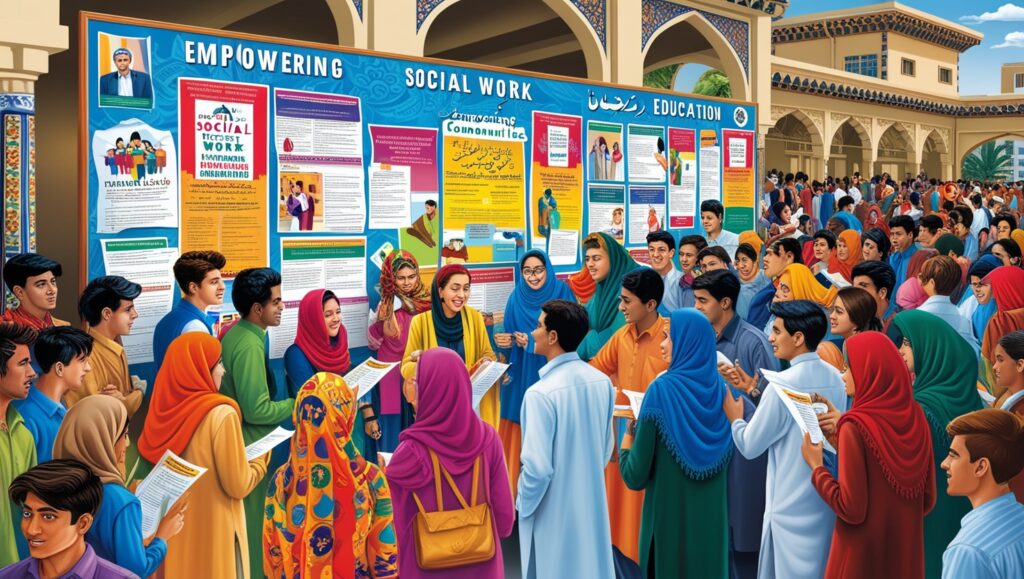It has only recently been that the inadequacies of the charitable approach in the modern context of social services have been badly felt. This has resulted in realizing the need for new methods of dealing with aging and new problems created due to urbanization and industrialization.
Consequently, there has been a search for a scientific approach and effective means of dealing with these problems, which have become complicated in nature and bigger in magnitude. Thus, the need for social work education was realized.
Objectives of Social Work Education
Social work education attempts to provide trainees with knowledge, skills, and attitudes to become an effective social worker. More specifically, social work education provides a student with:
- A sound body of knowledge of factors that condition the nature and development of man and of the society in which he functions;
- A conviction of the rights and capacities of people and a scientific base for social work practice;
- Certain skills and techniques will enable him to translate his knowledge and convictions about man and society into effective action.
Consequently, social work has borrowed heavily from other sciences, which was inevitable initially. It helps social workers understand sociological, psychological, and economic factors, all of which interact with an individual to varying degrees. Given this fact, most schools of social work at the time of admission prefer those who have studied one or more of the social sciences at the undergraduate level. Thus, the study of social sciences is a prerequisite for social work training, particularly for those having no background knowledge of social sciences.
Development of Social Work Education in Pakistan
The first in-service training course began on 2 October 1952 and lasted till 2 April 1953. The main objective of the training course was to determine the prospective pattern of social work training best suited to the needs of Pakistan. It was the first social work education program in Pakistan, a short-term in-service training course to strengthen skills and discover leaders and teachers for developing social work education.
The second course was organized in Dhaka in September 1953 for the next three months. While evaluating the Dhaka course, the training team formulated some guidelines for planning future social work training in Pakistan. Several other training courses were also organized from time to time. These were intended to identify the welfare needs and determine the appropriate training type. These experiments and learnings from the short courses were conceived as preparations for more extensive training at the university level.
On 15 November 1954, with the cooperation of provincial and central governments, Punjab University started a year-long diploma course, whereas, in 1956, a master’s in social work was started. In 1956, Punjab University also started social work at the bachelor’s level, whereas in 1959, Dhaka University started social work at the bachelor’s level as an optional subject. During the 2nd five years, plan in 1961, Karachi University started social work as a bachelor as an optional subject in two-degree colleges. In 1966, Sindh University, 1974 Balochistan University, and 1978 Peshawar University started social work.
Social Welfare Training Institute
Through an agreement between the Government of Pakistan and UNICEF, two Child Welfare Training Centers in 1963, one in Lahore and the other in Karachi, were established to train personnel of voluntary agencies in 1966-67, respectively. The latter has been renamed the Social Welfare Training Institute and provides in-service training to voluntary agency workers and the Directorate of Social Welfare.
Similar training institutes were established in the provinces of Baluchistan and N.W.F.P. The Federal Ministry of Special Education and Social Welfare has upgraded its training center into a Social Welfare Training Institute for higher levels, longer durations, and extensive training courses for social workers in the public and private sectors.

Training Courses at SWTI
SWTI offers various types of training courses, broadly categorized as follows:
- Post Induction Trainings
- Pre-Promotion Mandatory Trainings
- Short Courses
- Training of the Trainers
- Workshops & Seminars
First Conference of Social Work Educators
The First Pakistan Conference of Social Work Educators was held in Dhaka in 1964. Representatives of various university departments, government agencies, and field representatives attended the conference. It was intended to provide a forum for the exchange of experiences and to recommend necessary modifications in the curriculum to bring about uniformity and consistency. One of the main purposes was to examine whether the social work curriculum was aimed at fulfilling our needs and problems.
It is to be remembered that a concept or a method, however useful and effective elsewhere, may not be at all effective in the socio-cultural setting of Pakistan. “Fruits of technological development may be useful for all countries, but programs of social welfare of each country must be of its own.
For a program in social work education, it is most important that knowledge be taken of the present social needs and problems of the country for which social workers are being trained.” A social worker needs to be aware of the country’s socio-cultural value system, political institutions, and socioeconomic needs and problems. It cannot be done through the literature of foreign countries, which can be useful only as background and historical teaching.
Our education system is such that there is a gap between the way of life of an educated person and that of an uneducated person. As a vast majority of our people are illiterate, ‘Westernized’ social workers often fail to understand and appreciate the problems of society.
Identifying the specific objectives of social work education in the country is desirable. The advanced countries of the West had well-organized and developed agency services, as social work was established there long before it attained general profession recognition.
In developing countries like Pakistan, the primary concern of social welfare is “doing away with deeply rooted poverty, eradication of illiteracy, relieving effects of urbanization and industrialization, improving family life, and initiation of self-help and cooperative efforts.” Social work education should be ‘generic’ and not specialized. The social work students are expected to be able to analyze problems at the macro and micro levels and develop the capacity to seek alternative strategies for problem-solving.
In short, social work education should be in tune with social reality. Keeping this fact in view, we should devise a curriculum that, within two years, can prepare social workers who are confident and competent enough to work in the field, to assume their chosen roles, and to carry out their tasks effectively, satisfying them and their clients, i.e., the people with whom they work.
Social Work Curriculum
The Social Work Curriculum Revision Committee, comprising representatives from Social Work departments in various universities and their affiliated colleges across the country, met on 6-8 August 2002 at the University Grants Commission, Islamabad, to discuss curricula for bachelor’s and master’s levels.
However, despite all the above emphasis on the need for locally relevant social work training, the curriculum was based on Western practices. For example, those involved in the early years of social work training noted how Pakistani teachers and students of social work found it difficult to integrate social casework (a specialized method of social work used in one-on-one professional relationships) into the Pakistani context, where families and communities predominate over individuals.

The contents of the training course at the postgraduate level include the following areas:
Foundation Courses
The purpose of Foundation Courses is to provide a certain background for students in social sciences and to prepare them intellectually and emotionally before being initiated into the theory and practice of social work. It helps students to acquire pertinent knowledge about an appropriate attitude towards men, groups, and society and their interaction.
To understand the problems of an individual, it is necessary to understand his functioning or malfunctioning about the socioeconomic context that has contributed to the person’s problems. Hence, the study of social sciences, like sociology, psychology, economics, etc., is of great importance in understanding the totality of the situation in which a person finds himself.
Method Courses
The course at the next stage comprises the study of specific social work methods such as Case Work, Group Work, Community Organization, Social Welfare Administration, Social Action, and Social Research. All students are required to study all these methods, and there is not much specialization in any of these methods.
It is necessary because anyone functioning in any social work field will have, at one stage or another, opportunities to use the skills involved in other social work methods. In the United States, specialization has been carried very far regarding these methods. This kind of intensive study, one of the methods, may be suitable because of the definite demands of caseworkers or group workers in social welfare institutions in the U.S.A. However, in Pakistan, this pattern is not followed.
For example, the method of community organization is very significant because of the nationwide community development program being launched in the country. While carrying on the duties of a community organizer or administrator, one will be called upon at several stages to use casework and group work skills because they are engaged in dealing with people who naturally confront them as individuals or in groups.

Specialization Course
Generally, during the final year, students specialize in one of the many fields of social work, such as Medical Social Work, Community Development, Rural Welfare, Labour Welfare, Family and Child Welfare, Youth Welfare, Gender studies, Institutional Care, and Correctional Services.
After taking preparatory courses in social sciences and general courses in methods of social work, students are given opportunities for intensive training in one of these fields: social work. Almost all university departments of social work in Pakistan offer a general training course covering all the methods and important fields of social work, with particular emphasis on any of them.
In view of multiple problems in the field of social welfare, the general course of training seems more applicable to our conditions. Pakistan needs general practitioners of social work in view of limited employment opportunities for social workers in the country. The fields that provide more employment opportunities have been Community Development, Medical Social Work, Special Education, Labour Welfare, and Family Planning.
Followed by Correctional Administration and Social Work Education to a lesser extent. Some are of the view that successful practice of social work in different settings and the ability to discharge particular requirements of specific jobs in these different fields require much more than a general preparation, and therefore, more intensive training in one field is necessary to equip one to fully discharge duties arising out of work in a particular field.
However, we should not ignore the dangers inherent in narrow specialization in social work. It would not only prove detrimental to the growth of the profession itself. Still, it will also give a severe blow to voluntary efforts, which at the moment are not very encouraging and in which lie the roots of the profession.
Special Education
No progress can be made without training special education teachers and skilled rehabilitation workers. Therefore, ongoing projects of the National Institute of Special Education (N.I.S.E.), the National Institute of Handicapped, Provincial Training Institutes, and the sequence of Special Education Training in Allama Iqbal, Punjab, and Karachi Universities should be reformed to strengthen and expand the training program.
At the same time, projects for establishing new Special Education Schools and introducing Special Education in ordinary schools should be undertaken at the federal and provincial levels.
Social Work Universities in Pakistan
The initial Western format of the curriculum, which was used out of necessity in the first training course, dictates the contents of social work education even after half a century and the expansion of social work education up to the M.Phil/PhD level in nine leading universities of the country. According to 2024, web-based research, social work education programs are carried out at;
- University of Punjab (www.pu.edu.pk)
- Islamia University Bahawalpur (www.iub.edu.pk)
- University of Sargodha (www.uos.edu.pk)
- University of Peshawar (www.upesh.edu.pk)
- Kohat University of Science and Technology (https://www.kust.edu.pk/kust/)
- University of Malakand (https://www.uom.edu.pk/)
- Karachi University (www.ku.edu.pk)
- University of Sindh Jamshoro (www.usindh.edu.pk)
- University of Baluchistan, Quetta (www.uob.edu.pk).
Regarding social work education, the initial emphasis on evolving an indigenous social work philosophy grounded in the needs and aspirations of the Muslim society remained till 1969, when the first study on the effectiveness of social work training in Pakistan was conducted.
The findings of the study revealed that 17% of all graduates (the study covered 1957–1965 1965 graduates) could relate Social Work theory (used broadly as the contents taught in the classroom) to practice to a great extent, and almost half (49 %) to some extent. At the same time, though, by ranking subjects based on their practical utility in society, graduates indicated the need for improvement in method courses, including Social Group Work, Community Development, Social Administration, and Social Research (Department of Social Work, 1969, pp. x, xvi).
However, these improvements could never be brought about; as noted by Rehmatullah,’very little social work literature has been produced, and social work methodology of “group work” and “casework” is still being taught in the same manner as in 1954′. In short, these programs still lack ‘an authentically Pakistani approach to social work centering on the country’s religious heritage, concepts of family and cultural diversities.’
Given the importance of social work education in the present complex life, this discipline needs extensive academic and intensive fieldwork training under professionally trained workers. It is, therefore, suggested that this program should be extended to all degree colleges, particularly with the beginning of social work at the intermediate level, and the existing university departments should be strengthened so that they may produce a fair number of trained social workers needed for managing government and non-governmental organizations.
Conclusion
As stated earlier, modern social welfare programs were introduced in Pakistan through the government’s initiative. It shows that, from the beginning, the government has recognized the need for social work training for personnel organizing and administering social welfare programs. However, since social work education in Pakistan was initially organized and developed by Western social work educators, it leans heavily on patterns and institutions developed in the West, especially in the U.S.A.
It is desirable to evaluate and modify the training program from time to time in the context of the country’s socioeconomic needs and problems. Further, the Pakistan Council of Social Workers should be formed to promote and safeguard the interests of trained social workers and to develop the social work profession scientifically.






